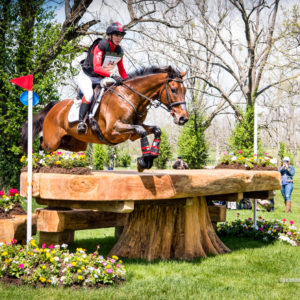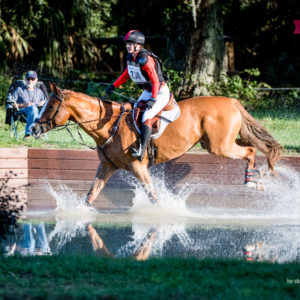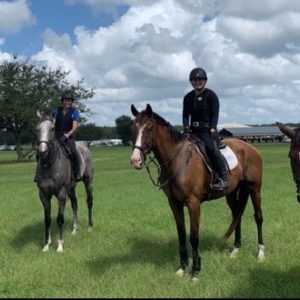SMART goals are Specific, Measurable, Actionable, Relevant, and Trackable. With life changing daily across the country right now, most of us will be spending a lot of time training at home this month. For some of us the ability to take regular lessons or travel to practice and school at different venues will not be possible. For many riders who board their horses, going to the barn may even become a limited activity. It could be an easy month to feel unsure about what type of training to do or to feel stuck in a rut. Using SMART Goals will help boost your confidence and purpose!

First, consider the difference between extrinsic and intrinsic goals. Extrinsic goals focus on ‘be good’ outcomes and performances. One example of an extrinsic goal is challenging yourself to canter a line of cavaletti jumps in five strides, then six strides, then four strides. Intrinsic goals focus on ‘get better’ outcomes and these goals relate more to building competence and mastery. An example of an intrinsic goal is deciding to practice leg yields during two different rides in a week. Both types of goals are useful.
Right now it is the beginning of a new month. All competitions are shut down for the foreseeable future. It is a very good time to set goals that center around intrinsic motivation and are authentic to your own riding. As you gain more mastery, your performance will improve and your extrinsic goals will be more attainable as well. With this in mind, brainstorm a few Specific goals for the next four weeks. Write them down. Be open minded. Perhaps your goal is to create a better independent hand and seat so that you have more strength over jumps, or perhaps your goal is to maintain core fitness and flexibility for riding at home even when you can’t make it to the barn.

Next, think about how Measurable your goals are. For me, this usually centers around how many days during the week I am going to work on a different skill set. When I teach my horses to do flying changes, for example, I often decide that I will practice changes three days a week. During at least two of those rides, I only do a few flying changes. I just touch on them and then move on to other things so that my horse doesn’t feel frazzled. For riders who maybe can’t make it to the barn as often as they would like, a great goal might be to do yoga two days a week to improve balance and flexibility and go for a run three days a week to maintain cardiovascular fitness.
As far as Actionable, think about the resources you have available to you this month. I was just talking to one of my students about her training program for her preliminary level OTTB for the weeks ahead. He needs to become stronger in dressage, but he also really likes variety and doesn’t like getting drilled. She is going to be riding at home all month. I suggested she place a cavaletti jump in the middle of a flat area and on some days not do a traditional dressage ride but instead ride him in the open, cantering the cavaletti on a large circle in both a working and lengthen canter to practice balance, rhythm, and rideability. This will help him to stay fresh and engaged in his work.
Making a goal Relevant will improve your own motivation to pursue it. When I coach, I am amazed at how many students come to me not really having any idea of what they would like to improve. The more you understand clearly the areas that you would like to improve, the more you can create goals that will help your riding to flourish.

Lastly, make your goals Trackable. For the month of April, write down week by week what you would like to do to reach your goal, and a vision of where you want to be with this goal by the end of the month. Then, each week as you do what you had set out to do, check it off your list and write a small reflection about how the week went. If one week doesn’t go as well as planned, think about why that was, and regroup for the next week.
In riding we always need to be ready to change from plan A to plan B. This month, our innate resilience as event riders will be put to the test in other areas of our life as well. For many, this will be a very challenging time, but perhaps with the right outlook, this time can be used to grow in our riding through setting creative goals and working towards them!
Ashley Johnson is a 5* Event Rider and an ICP Level III Certified Instructor. She is based in Ocala, FL and coaches the University of Florida’s Eventing Team. Ashley is pursuing a master’s degree in psychology through Harvard University’s HES School with a focus on sports psychology. If you would like a customized at-home training program with video and phone call accountability check-ins, contact Ashley at alequestrian@gmail.com.
